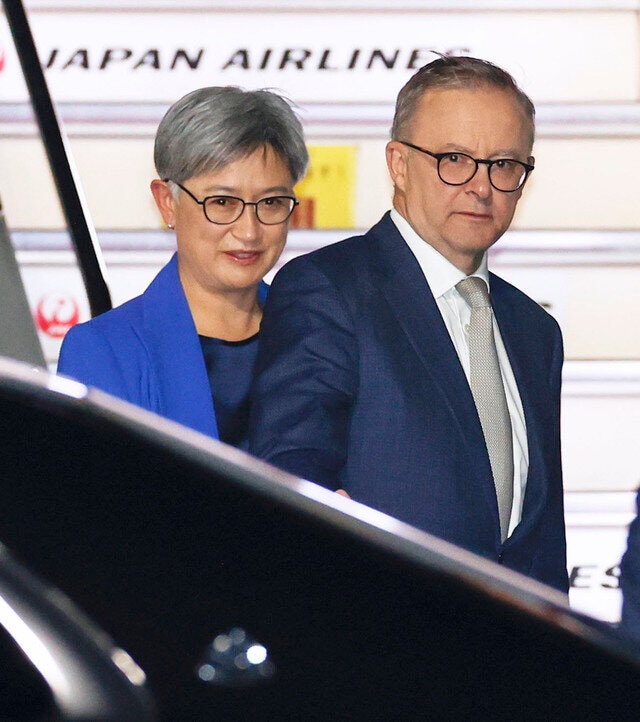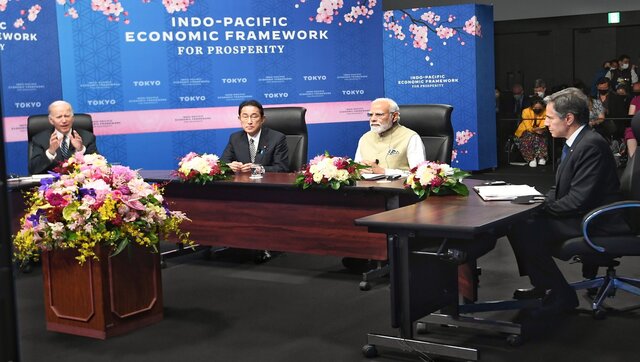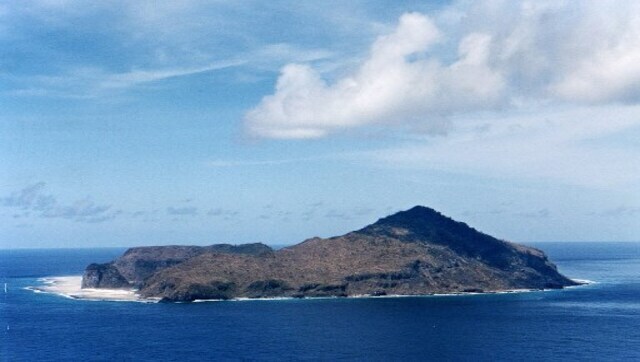As China continues to bully its neighbours and plays aggressor on the high seas, newly elected Australian Prime Minister Anthony Albanese and Foreign Minister Penny Wong are looked at with interest to see if they reverse Scott Morrison’s stand on China. [caption id=“attachment_10714021” align=“alignnone” width=“640”]  Australian Prime Minister Anthony Albanese, right, and Foreign Minister Penny Wong at Haneda International Airport in Tokyo, 23 May, 2022. AP[/caption] In the lead up to the elections, the Labour party they belong to has been painted as being soft on China. Despite the belief that the outcry around the subject was more for a domestic audience, Penny Wong has stated that she does hope to see the bitter feud between China and Australia simmer down. While she has said that Australia will not back down on the issues currently plaguing the Australia-China relationship such as foreign interference or human rights abuses, her party is seen as much more likely to look for a reset in the relationship as compared to the previous coalition government. Despite all the naysaying, however, Anthony Albanese has pledged additional aid for Pacific neighbours to counter Chinese interest in the area. He is also no stranger to India and has committed to deepen ties with the country. Although Japan and India have been consistent in their approach to maintaining status quo in the Indo-Pacific, the Quad approach to countering China has been relatively subdued after the Trump administration was replaced. The meetings between member countries since then show that focus has shifted to include issues such as vaccines and Ukraine, rather than remain on Indo-Pacific security. While a similar dampening of Australian enthusiasm towards the Quad stand on China is being suspected due to the change in government, it is more likely that Australia will stay the course for now. With the Solomon Islands flare up and lack of Chinese interest in a diplomatic approach to Australia, a review in the relationship may take longer than currently imagined. [caption id=“attachment_10713411” align=“alignnone” width=“640”]  Leaders of Quadrilateral Security Dialogue (Quad) from left to right, Australian Prime Minister Anthony Albanese,U.S. President Joe Biden, Japanese Prime Minister Fumio Kishida, and IndianPrime Minister Narendra Modi,pose for photo at the entrance hall of the Prime Minister’s Office of Japan in Tokyo, Japan, Tuesday, 24 May, 2022. AP[/caption] In contrast, US statements regarding military intervention in Taiwan have caused angst in China, following which US President Joe Biden has said that the US will maintain “strategic ambiguity” about Taiwan. He has also stated that since “they” did not impose any of the current tariffs on Chinese imports, he would consider lifting them. US Trade Representative Katherine Tai has also said that the country must be “strategic” with regard to the tariffs, and that all options were on the table. With the country facing record-level inflation, easing the economy would require the US to take pro-China measures despite the anti-China rhetoric. President Biden has also launched the highly awaited Indo-Pacific Economic Framework for Prosperity (IPEF) in Tokyo. IPEF includes 12 countries that account for 40 per cent of global economic output and is a move to contain China’s market monopoly, but the impact of the IPEF framework, unlike that of tariffs, will depend on specific agreements that come later. [caption id=“attachment_10710481” align=“alignnone” width=“640”]  US President Joe Biden launched a new Asia-Pacific trade initiative, with 13 countries including India and Japan signing up, on Monday in Tokyo. Twitter/ @narendramodi[/caption] While Indian Prime Minister Narendra Modi has been effusive in his outreach towards Japan and the diaspora community there, he has also often been at the forefront of shifting focus to a stable Indo-Pacific. In contrast with Chinese autocracy, he mentions India being a responsible democracy. India has also accepted Japanese assistance in developing the strategically important Andaman and Nicobar Islands. Once the islands are sufficiently developed with regards to infrastructure, the Malabar exercises by Quad member nations can be conducted using the facilities. As a neighbour that shares a border with China, and surrounded by Chinese client states that India is trying to win over, the Indo-Pacific is understandably a more urgent priority for the country. Yet, the Quad focus has moved from security to climate change, healthcare and “clean shipping”. While the multilateral alignment on different issues makes the grouping likely more effective as a partnership and offers various venues of cooperation, the US commitment to countering China remains to be tested. With the recent change in the Australian administration, a re-evaluation of Australian priorities within the Quad framework is yet to be measured as well. There are many reasons why the Quadrilateral Security Dialogues, shortened as Quad, are not akin to NATO, despite China’s musings on the matter. However, the fact remains that Chinese belligerence at its borders on land and sea does not show any signs of abating, while also retaining market monopoly over the democracies of the Quad. The “Security” aspect of the Quad dialogues will need to continue to be addressed, despite rhetoric about multi-pronged, wider collaboration. The current meeting has led to a few steps towards reducing Chinese dependency over IT infrastructure and market matters, which, if implemented, have a lot of potential in re-imagining global economics. These are likely to take a long time to work out amongst member nations, though, and countries should ask if China will provide them the benefit of time when it comes to countering market monopoly. Despite being initiated over a decade ago, it is only in 2021 that the first in-person Quad summit was conducted. With former Australian Prime Minister Kevin Rudd, also from the Labour party, having backed off from previous iterations of the grouping in order to assuage China, the grouping offers a lot of potential to the current Australian government to reiterate its commitment to Australian national security. Since the Scott Morrison-led coalition government was blamed for allowing Solomon Islands to fall into the Chinese sphere of influence all too quickly, the new administration can demonstrate their seriousness by working on the partnership. Chinese influence is also suspected to be causing a delay in allowing the Indian High Commissioner to visit the island chain. The security of the region remains a top priority for Quad nations to address, despite meanderings on other issues. [caption id=“attachment_10714071” align=“alignnone” width=“640”]  Representational image. AFP[/caption] With the global geopolitical scenario being dominated by Europe currently, long-term global strategy cannot afford to be dismissed. China’s rise in a global multipolar order will need to be balanced with a strong, democratic approach to Indo-Pacific security. If the grouping intends to make it happen, action must follow words. If the words remain vague, action is unlikely to have much impact. The Quad is best suited to ensuring a tangible counter, and the implementation of the various agreements between member nations will offer more hope for global stability. The best outcome will be that the game yields no losers among members of Quad. The author is a Masters in Biotechnology from the University of Bath, an MBA, a columnist, and a podcaster. Views expressed are personal. Read all the Latest News , Trending News , Cricket News , Bollywood News , India News and Entertainment News here. Follow us on Facebook, Twitter and Instagram.
China’s rise in a global multipolar order will need to be balanced with a strong, democratic approach to Indo-Pacific security. If Quad intends to make it happen, action must follow words
Advertisement
End of Article


)

)
)
)
)
)
)
)
)



